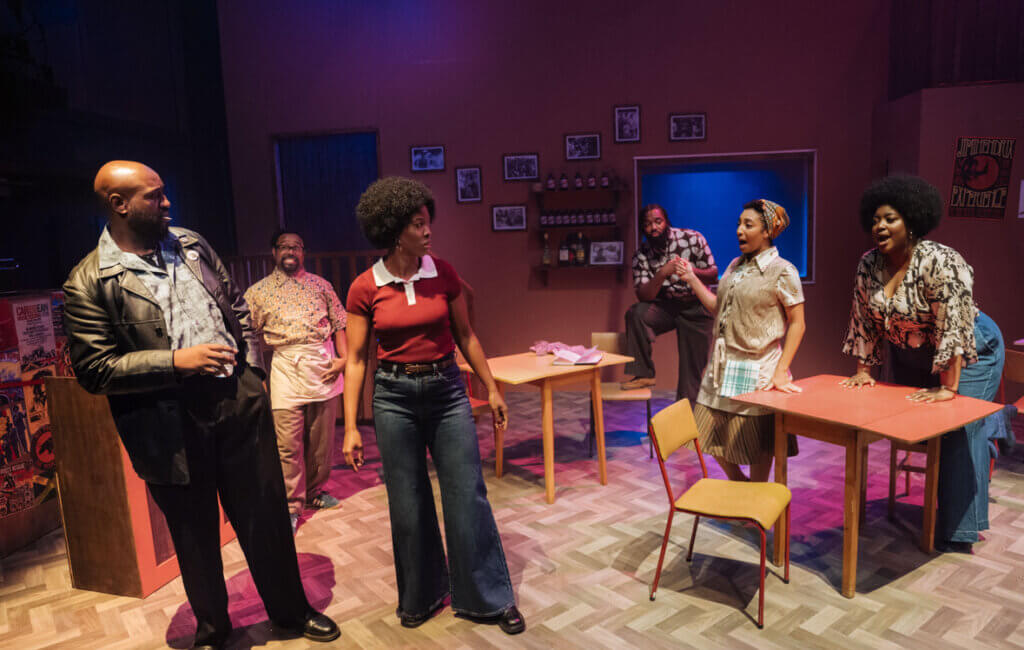
Credit : Helen Murray
I rolled up to Brixton House on Friday night for the world première of Black Power Desk. The foyer was buzzing, with media heads, influencers and creatives sipping on specially themed cocktails. Everybody seemed charged with excitement, ready for the show to begin.
Under the visionary leadership of Delia Barker, Brixton House has evolved into a home for bold and unapologetic Black storytelling. Black Power Desk is part of its UPRISING Festival, which celebrates “voices of resistance and change, past and present.” Co-produced with PlayWell Productions, Birmingham Hippodrome, and The Lowry, and directed by Gbolahan Obisesan, the show dives deep into the untold stories of the Black Power Movement in 1970s Britain. Have you heard of the Mangrove Nine, Oval Four and Stockwell Six? These landmark cases marked turning points in the fight for civil rights, laying bare the institutional racism and policy brutality faced by the Black community.
Urielle Klein-Mekongo, Black Power Desk’s writer, reimagines these stories with passion and finesse. Alongside Gerel Falconer, the show’s ‘rapperturg’, they deliver a script that’s raw, poetic, and uncompromising. Told in two acts, they weave a fierce and moving narrative about Black identity, resistance, and love, with a powerful spotlight on the brilliance and resilience of Black women. As Klein-Mekongo puts it:
“When I was growing up, I could name Rosa Parks […] But I couldn’t tell you about Barbara Beese or Altheia Jones-Le Cointe. I couldn’t tell you about the Black women who stood on the frontlines here, whose courage and brilliance should have been shaping the way I understood my own place in the world. That silence stayed with me. It lit the spark that became Black Power Desk.”
Set in ‘The Drum’, a Harlesden spot where food, music, and activism converge, we meet a crew of young Afro-Caribbean organisers. Dina (Veronica Carabai) is their fearless leader – she is smart and determined, but faces constant pushback from fellow activist Colin (Fahad Shaft) and even her own fiancé Jarvis (Alexander Bellinfantie). She’s also at odds with her sister Celia (Rochelle Rose), a singer and waitress at The Drum. Their relationship is strained by grief and tension, as they mourn the loss of their mother a year earlier. Celia works hard to provide for herself and her sister but feels lonely and underappreciated. Unlike Dina, she refuses to let her activism define her, and that desire for freedom draws her into a love that ultimately betrays her.
Police surveillance is a constant threat. A literal “Black Power Desk” is set up to monitor and suppress Black resistance, aided by undercover informants. Tensions build until a protest erupts into violence, leading to a wave of arrests. Dina ends up in the dock at the Old Bailey, standing tall as she defends herself and exposes the system with fire and conviction, her loved ones by her side.
The music? Pure vibes. Renell Shaw’s score is a vibrant fusion of Calypso, Reggae, Ska, Soul, Grime, and Rap, delivered by a three-piece live band with precision and soul: Daniel Taylor on keys, Tendai Humphrey Sitima on bass and Romarna Campbell on drums.
The cast? Unstoppable. Rose’s vocals are emotionally electrifying, her control impeccable. Her final solo brought me to tears. Carabai’s voice is sultry and her delivery fierce. Bellinfantie brings depth and swagger. Faucher’s performance is grounded and tender. And Falconer and Shaft’s rap sections are on point and add lyrical gravitas to every scene.
Some of the lyrical compositions and dynamic choreography reminded me of Hamilton, a personal favourite of mine. The stage design was neat and adaptable, with simple but impactful props and stage lighting. Scene transitions flowed smoothly overall. Big up to Jade Hackett, the show’s movement director, for putting together movement sequences that kept the pace tight and intentional.
Gail Babb’s dramaturgy brings emotional depth and moral clarity to the production, and the immersive elements – with us in the audience posing as activists and jury members – made us all feel part of the plot.
The final number? A call to breathe. To resist. To remember that we belong. In a time of rising xenophobia and misogynoir, Black Power Desk is a bold, brilliant reminder of Black (wo)men’s leadership and legacy.
The cast bowed to a standing ovation, visibly moved, as was the theatre crowd.
On the tube ride home, I flipped through the media booklet and landed on a prompt that stuck with me: “What’s your small or large act of resistance?” That question feels more urgent than ever.
Catch Black Power Desk at Brixton House until 28th September – make sure to pull up!
